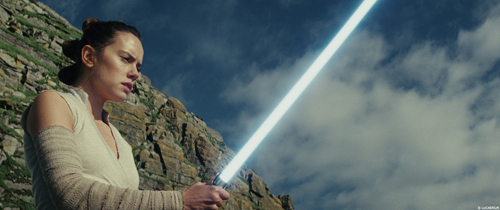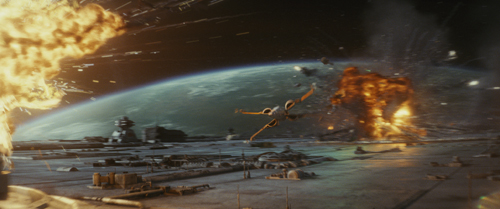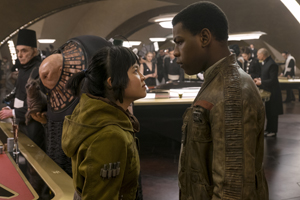
Your complimentary articles
You’ve read one of your four complimentary articles for this month.
You can read four articles free per month. To have complete access to the thousands of philosophy articles on this site, please
Films
Star Wars: The Last Jedi
Jason Eberl and Kevin Decker philosophize among the stars. WARNING: CONTAINS SPOILERS
As all observers of a particular galaxy far, far away know, there has recently been another awakening in the Force: Star Wars: The Last Jedi.
We reviewed Star Wars: The Force Awakens in Issue 115 of Philosophy Now. Our review of that film concentrated on the themes of disenchantment and ‘doubles’ – in particular, pointing out similarities with the original trilogy. We quoted Bryan Seitz of Babson College as saying, “Philosophy finds power and security in the double but from it simultaneously inherits countless forms of dependence and instability.” The Last Jedi promises that the Star Wars franchise, and perhaps philosophy as well, is capable of transforming dependence and instability to yield something genuinely new.
The original Star Wars trilogy unfolded as a classic morality play of good versus evil, with a redemption story at its heart: in a crucial moment, Darth Vader turns from the Dark Side of the Force to save his son, Luke Skywalker. The prequel trilogy affirmed this dualist vision by depicting Anakin Skywalker in another crucial moment of decision: whether to save evil Chancellor Palpatine, who intimates that he holds the secret to saving Anakin’s wife from certain death, or to stand with Jedi Master Mace Windu in preserving freedom and democracy from the tyrannous Sith. He chooses the former, so becoming Darth Vader.

Rey learns to rely on herself, as expressed through her light sabre
Rey © Lucasfilm Ltd. & TM. All rights reserved.
Good Or Evil, Or Something Beyond?
The Last Jedi continues to use the language of the ‘Light Side’, the ‘Dark Side’, and ‘turning’ from one to the other. Early in the film, after finding him in “the most unfindable place in the galaxy”, Rey tells Luke that the Resistance needs him to return because “Kylo Ren [Vader’s grandson] is strong with the Dark Side of the Force.” Daisy Ridley’s deadpan delivery of this line is perfect insofar as she seems to be reciting from some gnostic textbook about the battle of good versus evil. Luke, however, has grown in wisdom beyond these simplistic categories to know that it is vanity to believe that the Force essentially belongs to the Jedi. He cynically but correctly points out that the Sith, and many others, are aware of, and capable of manipulating, the same Force. In Beyond Good and Evil (1886), Friedrich Nietzsche similarly argued that there is a fundamental ‘will to power’ which simultaneously undergirds and transcends the socially-constructed categories of ‘good’ and ‘evil’, and that the perpetuation of these moral categories serves to fuel the conflict between distinct social forces which are attempting to exert power over each other. In Revenge of the Sith (2005), Emperor Palpatine expressed this same idea by saying that both the Sith and the Jedi crave power and fear to lose it, indicating that this is the real root of their conflict (see Don Adams, ‘Anakin and Achilles: The Scars of Nihilism’ in The Ultimate Star Wars and Philosophy, eds. Eberl and Decker, 2015). Nietzsche’s insight might have served the new trilogy well by providing a novel way of understanding the two moral categories. Alas, writer/director Rian Johnson pulled back, reducing Rey and Kylo Ren’s troubled relationship to a mere tug of war: who’s going to turn which way – towards the light, or towards the dark?
Anakin’s own turn to the Dark Side and into Darth Vader could also be examined in terms of the theology of Saint Augustine, as an evil resulting from ‘inordinate desire for temporal goods’ (see Jason T. Eberl, ‘“Know the Dark Side”: A Theodicy of the Force’, in The Ultimate Star Wars and Philosophy). While it isn’t intrinsically wrong, according to Augustine, for a man to love his wife, as Anakin loved Padmé, such love for an ultimately perishable person must be weighed against more eternal goods such as justice. In an Augustinian framework, Anakin’s downfall is due to his privileging his attachment to a mortal human being over the more fundamental good of justice in the galaxy.
If Augustine was right that we are fundamentally motivated by what we perceive as good for us, then perhaps we should ask what good(s) Rey and Kylo Ren are pursuing as they turn this way and that. Rey – as Kylo points out – seeks belonging; she seeks relationship with those from whom she expects unconditional love: her parents or some suitable surrogate. However, her experience in the cave on Ahch-To reveals to her that she can only count on herself for self-affirmation. This echoes Ayn Rand’s objectivist view that people will only progress if each individual pursues their own rationally-chosen self-interest; or in other words, that each of us has the potential to flourish by our own devices (see for instance, The Virtue of Selfishness, 1961). This thesis may be contrasted with the communitarian ethos exemplified by neo-Aristotelians such as Alasdair MacIntyre and Martha Nussbaum. Both of these thinkers contend that individual human flourishing – the actualization of each person’s natural capabilities – can only be brought about within a supportive social environment, with institutions (such as the Jedi Order) enshrining practices (the training the Jedi receive) that yield goods internal to such practices (that is, Jedi virtues). So, despite her experience on Ahch-To, The Last Jedi ends with Rey on the Millennium Falcon with General Leia Organa and a severely downsized Resistance clinging to the hope that they “have all that they need” to defeat the First Order – namely, each other. By contrast, in his final shot, Kylo Ren is noticeably alone. The apparition of the last link to his father Han Solo – a pair of dice – disappears in his hand as he watches Rey close the door to the Falcon. He wanted to ‘kill the past’, and he got exactly what he wished for.
Interstellar Anti-Dogmatics
The three Star Wars trilogies have given us three seemingly competing, yet complementary, views of the Force. In the original trilogy, it was “an energy field created by all living things… that binds the galaxy together.” The prequel trilogy introduced the concept of ‘midi-chlorians’ – ubiquitous tiny organisms mediating the Force – at which idea many fans balked, since it seemed to reduce the Force to matter; but it arguably rather served as a physical correlate of the mental Force just as neuronal firings arguably serve as a physical correlate to essentially immaterial mental states. The Force Awakens and The Last Jedi affirm the ubiquity of the Force – as something accessible by non-Jedi such as Maz Kanata and Force-sensitive children such as the boy we see at the end of The Last Jedi.
The need to reconcile these views, reminds us of an ethical lesson: avoid dogmatism! In Revenge of the Sith, Palpatine counseled Anakin that “If one is to understand the great mystery, one must study all its aspects, not just the dogmatic, narrow view of the Jedi.” Yoda, by the time of The Last Jedi, has also come to understand that the best students grow beyond what their masters have taught them. Yoda himself arrogantly thought that the Jedi held all the answers until he failed to defeat Darth Sidious; while Luke in The Last Jedi reaches the point of contending that “the Jedi must end.”

A galaxy of philosophy
Canto Bight © Lucasfilm Ltd. & TM. All rights reserved.
Socio-Political Adventures On The Planet Of The Rich
The adventure of the ‘rebel scum’ Rose and Finn on the planet Canto Bight is an extension of The Last Jedi’ s secondary plot. A ‘master codebreaker’ is reputed to be gambling there, and they believe they can hire him to disable the First Order’s tracking system as it pursues the few remaining Resistance vessels through space. In the end, Rose and Finn retain the services of an ‘alternative’ codebreaker, portrayed by Benicio del Toro – unnamed, but referred to in promotional materials as ‘DJ’. This development at first apparently reinforces Rian Johnson’s overarching theme of ‘anyone can be a hero’. Yet, as so often happens in The Last Jedi, what director Johnson giveth, Johnson also taketh away: Finn and Rose are betrayed by DJ aboard Snoke’s massive ship, the Supremacy. Their plan to help the Resistance fleet comes to naught and, even worse, this results in the First Order learning the Resistance’s plan to escape to an abandoned rebel base on Crait.
Canto Bight and DJ represents another ‘doubling’: DJ is Han Solo seen through a glass darkly, while Canto Bight, a casino city and playground for the ultra-rich, is a white-collar version of the Mos Eisley cantina or Maz Kanata’s castle on Takodana. Rose and Finn are shocked to be shown that the wealth of Canto Bight has been gained through the sale of weapons to both sides. “It’s all a machine, partner. Live free. Don’t join,” DJ tells Finn, implicitly predicting that he’ll follow his own advice.
DJ and the mega-rich of Canto Bight represent the amoral galactic hegemony of the Star Wars universe; an irresistible economic force standing behind both the black hats and white hats. This war-based economy is built on cruelty, which the film illustrates through the brutality towards both the racing creatures called ‘fathiers’ and to orphaned children – thus calling into question neoliberal arguments about the broader benefits of economic productivity per se. In other words, it shows that a booming market does not necessarily ensure general improvements in living standards, autonomy, and emancipation, or greater equality. We are meant to infer from what DJ says about it rather that Canto Bight and places like it establish hegemony – that is, a dominance unrestricted to mere economics, but extending over society and culture too. Almost a hundred years ago, the Marxist philosopher Antonio Gramsci highlighted such outcomes of capitalism, projecting that an ‘elite’ of entrepreneurs “must have the capacity to be an organizer of society in general… right up to the state organism, because of the need to create the conditions most favorable to the expansion of their own class” (‘Prison Notebooks’ in An Anthology of Western Marxism, ed. Roger S. Gottlieb, 1989, p.113.)

Rose and Finn on Canto Bight
Rose and Finn © Lucasfilm Ltd. & TM. All rights reserved.
The galactic hegemony revealed on Canto Bight undermines the idea of Star Wars as a fundamental struggle between good and evil. Meanwhile, in the real world, the global hegemony of the market throws up difficult questions for collectivist and individualist political theories alike. For example, when corporate monopolies largely direct public taste and their political lobbyists fill the public square with ideological noise, it’s difficult to know how to apply the idea from the communitarian ethicist Michael Sandel that the freedom of markets needs to be balanced by other values when deciding on the prioritization of public goods (see What Money Can’t Buy: The Moral Limits of Markets, 2012). Similarly, liberal theorists such as John Rawls might find it challenging to meaningfully assert that the choice of economic arrangements “must be made on moral and political as well as on economic grounds. Considerations of efficiency are but one basis of decision and often relatively minor at that” (A Theory of Justice, rev. ed., 1999, p.229). One can all too easily see today how popular insecurity over job outsourcing, plant closures, and the shrinking social safety-net might be exploited by authoritarian politicians – some of whom are going to be in big business, as Gramsci predicted. Indeed, in Revenge of the Sith, Emperor Palpatine was voted into power on a wave of insecurity about a military threat to the Republic.
Subversion & Repetition
In reviewing the most controversial episode yet in the Star Wars saga, it is perhaps no surprise that we have so often had cause to refer to philosophers – Augustine, Nietzsche, Gramsci – whose thought was subversive of the dominant culture of their times. Their examples show that philosophy is indeed capable of transforming dependence and instability into the promise of something genuinely new. However, this promise is not really redeemed in The Last Jedi. The dialectic between Kylo and Rey and, by extension, that between the Dark and Light Sides of the Force, is stressed, prodded, and presented for the audience’s re-evaluation, yet without any substantial change really being made in the relationship of the protagonists. Kylo and Rey’s brief alliance against Snoke can’t be sustained, as Kylo reaffirms his villainous character and Luke proclaims that he will not be the last Jedi. The relative lack of development for the characters of the Canto Bight subplot – DJ, Rose, and Finn – leaves us with a pastiche of engaging with injustice on a galactic scale rather than really engaging with the problem of the hegemony of the super-rich. To these mega-wealthy masters of war, the titular ‘star wars’ are little more than a distraction from what’s going on in their galactic banks and hedge fund accounts. Similarily, Luke Skywalker’s last great act is to produce a powerful illusion that serves as a distraction to buy time. If we aren’t meant to draw the conclusion at the end of The Last Jedi that there’s a kind of nobility in deception, and entertainment value in defeating peoples’ expectations, what message was Rian Johnson trying to send?
© Profs Jason T. Eberl & Kevin S. Decker 2018
Jason T. Eberl is Professor of Health Care Ethics at Saint Louis University. Kevin S. Decker is Professor of Philosophy at Eastern Washington University. They are the editors of The Ultimate Star Wars and Philosophy (Wiley-Blackwell).









